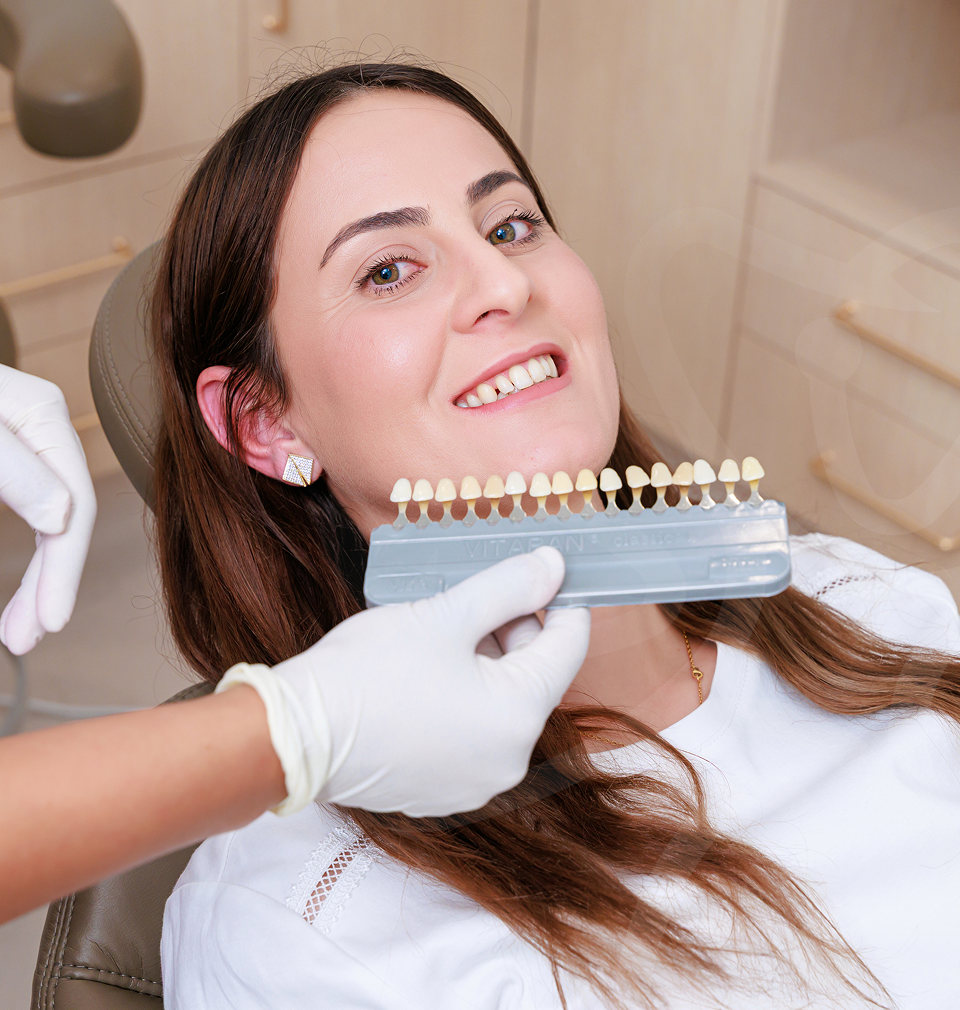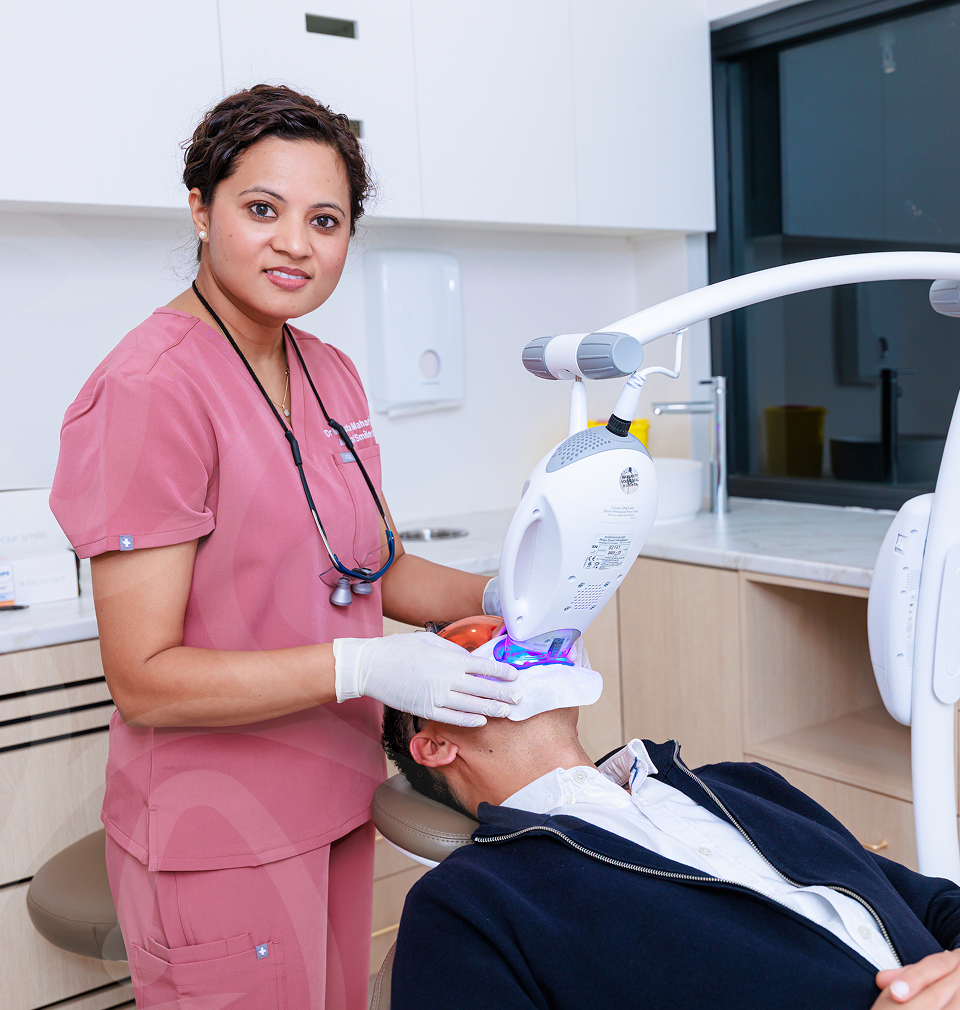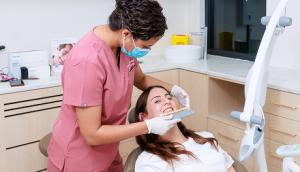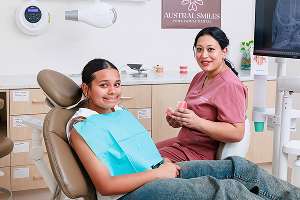Enhance the Appearance of Your Smile
Cosmetic Dentistry in Austral

Discover Cosmetic Dentistry in Austral
Cosmetic dentistry can improve the appearance of teeth through personalised treatments planned after an individualised oral health assessment. At Austral Smiles, your dentist will discuss suitable options based on your needs and oral health. We offer cosmetic dentistry in Austral with treatment plans tailored to each patient’s clinical circumstances and preferences.

Who May Consider Cosmetic Dentistry?
Discoloured Teeth
Teeth may become stained from coffee, tea, smoking, or ageing. Professional whitening may reduce the appearance of stains from coffee, tea, smoking, or ageing.
Chipped or Worn Teeth
Some teeth wear down or chip over time. Porcelain veneers are shaped to refine symmetry and the visible surfaces of your teeth.
Chipped or Worn Teeth
Some teeth wear down or chip over time. Porcelain veneers may be used to restore the appearance of teeth affected by wear or chipping.
Crooked or Misaligned Teeth
Mild alignment issues can affect the way your smile looks. Clear aligners may be used in some cases of mild alignment issues, depending on clinical suitability.
Uneven Tooth Proportions
In some cases, teeth may appear uneven in size or shape. Options such as veneers or crowns may improve the appearance of uneven teeth, depending on individual circumstances.

Exploring the Outcomes of Cosmetic Dentistry
Improved Tooth Colour
Professional whitening may reduce the appearance of stains or discolouration caused by coffee, tea, smoking, or ageing. Results vary between individuals and depend on lifestyle and oral health.
Restored Tooth Shape and Surface
Veneers may be used to change the size, shape, or surface of teeth affected by wear, chips, or discolouration. They are custom-made to fit each tooth and require continuous care.
Straighter Tooth Alignment
Clear aligners may be used to improve alignment in mild to moderate cases. Treatment timeframes vary depending on the complexity of the movement required and patient compliance.
Reducing Small Gaps or Refining Edges
Veneers may be used to change the shape and size of teeth, helping to reduce the appearance of small gaps. Clear aligners can gradually move teeth to improve spacing or alignment. Suitability is assessed during consultation.
Cosmetic Dentistry Options at Austral Smiles

Zoom Teeth Whitening
We offer both in-chair and take-home Zoom whitening. These treatments may reduce the appearance of stains from coffee, tea, or ageing.
Results vary between individuals and depend on factors such as oral health, lifestyle habits, and the type of discolouration.
Learn More
Veneers
Porcelain veneers are custom-made coverings placed over the front surface of teeth. They may be considered to change the shape, size, or colour of teeth.
Veneers are not suitable for everyone and require continuous care. Your dentist will assess your oral health and treatment goals before recommending this option.
Learn More
Orthodontics
We provide clear aligners such as Invisalign®, ClearCorrect®, and other systems. These appliances may be used to improve alignment in mild to moderate cases, depending on suitability.
Treatment duration and outcomes vary depending on the complexity of your case and how consistently aligners are worn as recommended.
Learn More
Tooth Gems and Dental Grills
We also provide tooth gems and dental grills as decorative options. These are non-therapeutic, and your dentist will discuss possible oral health risks and considerations with you before starting.

Start Your Cosmetic Dentistry Journey with a Consultation

A Relaxing, No-Judgement Space
We strive to create a professional and supportive environment where patients can discuss cosmetic dental options and make informed choices.
Flexible Payment Options
We offer flexible payment options to make treatment more manageable. Terms and conditions apply, and a full quote is provided after consultation.
Durable Treatment Outcomes
Cosmetic dentistry procedures at Austral Smiles use high-quality materials. Outcomes vary between patients and depend on oral health, treatment choice, and continuous maintenance.
Experienced Dentists
The dentists at Austral Smiles have over 30 years of combined experience providing cosmetic and restorative dental care. Each procedure is performed by a practitioner registered with the Dental Board of Australia.
Why Choose Austral Smiles for Cosmetic Dentistry
At Austral Smiles, we provide clear and comprehensive cosmetic dentistry treatment plans that are developed after a thorough consultation, allowing patients to understand their treatment options. Whether you’re considering whiter teeth or straighter alignment, our team tailors your treatment plan to your needs and goals.
Your Dream Smile Designed Just for You
At Austral Smiles, we combine professional dental care with genuine local hospitality, creating a positive, trusted experience for families in Austral and surrounding suburbs.
 A Relaxing, No-Judgement Space
A Relaxing, No-Judgement Space
 Results That Go the Distance
Results That Go the Distance
 Flexible Payment Options
Flexible Payment Options
 Experienced Dentists
Experienced Dentists

Information for First-Time Visitors
Our New Patient Information page outlines what to bring and how to prepare for your first appointment.


Package pricing is available for some treatments. Full details, including inclusions, exclusions, eligibility, and terms, are provided in writing before you begin treatment.

Payment Options
We offer a range of flexible payment options to help make your dental care more manageable.
We Accept All Health Funds


What to Expect from the Cosmetic Dentistry Process
Each stage is planned to provide clear information about treatment options, potential risks, and likely outcomes. Suitability and results vary depending on each patient’s oral health and treatment choice.
1 Initial Consultation
Your first visit includes a detailed oral health assessment. We’ll also discuss your treatment goals and may use digital scans or mock-ups to explore what’s possible before making any decisions.
2 Treatment Planning
We’ll design a treatment plan that outlines your chosen procedures, timing, and costs. We’ll also explain any benefits, risks, and considerations to support you in making an informed choice about your treatment options.
3 Treatment
Cosmetic dental procedures may be completed in a single visit or across several appointments, depending on the type of treatment. Progress is monitored at each stage, and adjustments may be made as clinically appropriate.
Meet the Experienced Dentists at Austral Smiles
Get to know our friendly dental team, each dedicated to providing personalised care to improve your smile and oral health.
Dr. Sushmita Dahal
DEN0001028720, General Dentist
With over 18 years of experience, Dr. Sushmita Dahal has worked across private, public, and not-for-profit clinics in Australia. She combines technical precision with creative skills in dental artistry and smile rehabilitation.
Learn MoreDr. Mamata Maharjan
DEN0001586185, General Dentist
Dr. Mamata Maharjan has over 15 years of clinical experience in Sydney’s public and private sectors. She focuses on preventive dentistry, root canal therapy, and clear aligner orthodontic treatments for adults and teens.
Learn MoreDr. Bandana Shakya
DEN0001148239, General Dentist
A graduate of Progressive Orthodontic Seminars (USA, 2015), Dr. Bandana Shakya offers implants and orthodontic treatments. She provides Invisalign®, ClearCorrect®, Spark®, ClearPath® aligners and performs complex wisdom teeth extractions. She also completed implant training with Osstem.
Learn MoreDr. Sarita Adhikari
DEN0001677199, General Dentist
Since graduating in 2004, Dr. Sarita Adhikari has delivered preventative, cosmetic, and restorative dental care. She promotes patient education, empowering individuals to take active roles in managing their long-term oral health.
Learn MoreAustral Smiles
average rating
ADA
Member


Answers to Your Cosmetic Dentistry Questions
Considering cosmetic dentistry in Austral? Here you’ll find clear answers to common questions about treatments, risks, and ongoing care.
What is the difference between general dentistry and cosmetic dentistry?
General dentistry and cosmetic dentistry both play important roles in oral care, but they focus on different outcomes.
- Purpose
- General dentistry focuses on preventing, diagnosing, and managing oral health concerns.
- Cosmetic dentistry is primarily concerned with enhancing the appearance of teeth and smiles.
- Common services
- General dentistry includes services such as check-ups, fillings, gum care, extractions, and root canal therapy.
- Cosmetic dentistry may include procedures such as teeth whitening, veneers, bonding, or reshaping.
- Health versus aesthetics
- General dentistry supports overall oral health and function.
- Cosmetic dentistry is usually elective and chosen to enhance appearance rather than address urgent health needs.
- Health fund cover
- General dentistry services are often covered by health funds.
- Cosmetic dentistry is generally classified as elective, so health funds may offer limited contributions.
- Patient goals
- People seeking general dentistry usually focus on comfort, function, and prevention of disease.
- People considering cosmetic dentistry usually focus on appearance, such as the colour, shape, or alignment of teeth.
How will I know which cosmetic dentistry treatment is right for me?
The right cosmetic dentistry option depends on your oral health, personal goals, and the condition of your teeth. A dentist will conduct an examination, discuss your concerns, and explain which options may be suitable.
Factors that influence the decision include the following:
- Current oral health:
The condition of your teeth and gums will guide which cosmetic options may be considered. Any concerns with oral health may need attention first. - Personal goals:
Some people may wish to change the colour or alignment of their teeth, while others focus on the shape or overall appearance. Your priorities guide which options are explored. - Available options:
Cosmetic dentistry includes approaches such as whitening, veneers, or bonding. Each option has different benefits and limitations, which your dentist will explain. - Longevity and maintenance:
Different procedures vary in how long they last. Longevity depends on the treatment chosen, your oral health, and ongoing care. - Risks and considerations:
All dental procedures involve some level of risk. Your dentist will explain possible side effects, recovery requirements, and how each option may affect your oral health.
A dental consultation is the most reliable way to decide which cosmetic dentistry option may be appropriate for you. This helps you understand what is possible, as well as the risks and responsibilities involved.
Are there risks with cosmetic dentistry procedures?
Yes, cosmetic dentistry procedures involve risks, just like any other form of dental care. The type and level of risk depend on the procedure chosen, your oral health, and individual circumstances.
Common considerations include the following:
- Tooth sensitivity:
Procedures such as whitening or veneers may increase sensitivity to hot or cold foods and drinks. - Gum health:
Some procedures may cause temporary irritation or inflammation of the gums. - Longevity of results:
Cosmetic procedures have varying lifespans. Materials may wear down or change over time, and replacement or adjustment might be needed. - Aesthetic variation:
Results differ from person to person. The final appearance depends on factors such as natural tooth structure and ongoing oral care. - General dental risks:
As with all dental procedures, there is a small possibility of discomfort, infection, or complications. These risks are uncommon but may occur, even when care is provided appropriately.
During your consultation, your dentist will explain the risks, benefits, and maintenance requirements of each cosmetic option. This discussion helps you understand what is involved and how different options may relate to your goals and oral health.
What is involved in a cosmetic dentistry consultation?
- Discussion of concerns:
You will have the chance to explain what aspects of your teeth or smile you would like to change. - Examination:
The dentist will assess the condition of your teeth, gums, and bite to understand your oral health. - Review of options:
Based on your examination and goals, the dentist will outline cosmetic options that may be appropriate, along with their potential benefits and limitations. - Consideration of risks:
Your dentist will explain the possible risks, side effects, and maintenance needs associated with each option. - Next steps:
If you wish to proceed, your dentist may recommend additional diagnostic tests, impressions, or photographs to aid in planning the next steps.
A dental consultation provides clear information on possible options, maintenance needs, and how they relate to your oral health and goals.
Are veneers considered cosmetic dentistry?
Yes, veneers are generally considered a form of cosmetic dentistry. They are thin shells made from porcelain or composite material that are placed over the front surface of teeth. Veneers may be considered to improve the colour, shape, size, or alignment of teeth.
As part of cosmetic dental treatments in Austral, veneers are often discussed alongside other options such as whitening or bonding. While they are mainly cosmetic, in some cases, they may also help enhance the appearance of a tooth that has been chipped or worn down. However, veneers are not suitable for everyone. They may involve the removal of some natural tooth structure, can increase the risk of sensitivity, and may need to be replaced over time.
A consultation is required to determine whether veneers are appropriate for your oral health and goals. Your dentist will explain the risks, benefits, and alternatives so you can make an informed choice.
How long do veneers last?
Porcelain veneers are designed to be long-lasting when properly cared for. Their durability depends on factors such as the quality of the materials, your oral hygiene, and lifestyle habits.
Key points about porcelain veneers:
- Longevity:
Porcelain veneers may last for many years, depending on individual oral health, care, and circumstances. Some patients may require replacement earlier. - Care requirements:
Daily brushing and flossing, attending regular dental visits, and avoiding habits such as chewing on hard objects can help extend the lifespan of your teeth. - Risk factors:
Teeth grinding (bruxism) or nail biting can cause veneers to wear down more quickly if not addressed. - Maintenance considerations:
Your dentist may recommend wearing a night guard or limiting your consumption of foods and drinks that can stain to help maintain the appearance of your veneers. - Risks:
Veneers may involve the removal of natural tooth structure, can increase tooth sensitivity, and will eventually require replacement.
Your dentist will check your veneers during routine visits to support the long-term health and appearance of your teeth.
What’s the difference between composite and porcelain veneers?
Composite and porcelain veneers can both enhance the appearance of teeth, but they differ in material, finish, longevity, cost, and treatment time.
- Material:
Composite veneers are made from a tooth-coloured resin, while porcelain veneers are created from a ceramic material designed to be long-lasting. - Appearance:
Porcelain veneers often provide a more translucent finish that can resemble the appearance of natural teeth. - Longevity:
Porcelain veneers may last longer than composite veneers, but longevity varies between patients, and some veneers may need earlier replacement. - Cost:
Composite veneers are generally less expensive per tooth compared to porcelain veneers. - Time involved:
Composite veneers are often completed in one appointment, while porcelain veneers typically require multiple visits to allow for custom fabrication in a dental laboratory. - Risks:
Both composite and porcelain veneers may involve the removal of some natural tooth structure, can increase sensitivity, and require ongoing care to maintain appearance.
Both composite and porcelain veneers can play a role in cosmetic dentistry, but the right choice depends on your goals, oral health, and budget. A consultation can help determine which option may be more suitable for you.
Are veneers covered by health funds?
In most situations, veneers are classified as cosmetic dental services and are generally not fully covered by health funds. However, some health funds may offer limited contributions depending on the type of plan you hold.
Important points to consider:
- Cosmetic classification:
Health funds usually classify veneers as elective procedures designed to enhance appearance rather than essential dental care. - Possible partial contributions:
If veneers are provided to restore a chipped or damaged tooth, some health funds may contribute under major dental benefits. - Review your policy:
It is important to check directly with your health fund to see what cover may apply to veneers. - Pre-approval recommended:
Requesting a written assessment before starting can help clarify the level of contribution available under your plan.
Your dentist can provide item numbers and treatment details during a visit to support any health fund enquiries.
For patients considering cosmetic dentistry in Austral, this discussion is an important step in understanding both the clinical and financial aspects of care.
What maintenance is needed after cosmetic dentistry?
Maintenance after cosmetic dentistry depends on the specific procedure; however, good oral hygiene and regular dental visits are important for maintaining oral health.
Areas to focus on include the following:
- Daily care:
Brushing twice a day with fluoride toothpaste and flossing daily may help protect both natural teeth and cosmetic work. - Regular dental visits:
Regular check-ups allow your dentist to monitor the condition of cosmetic work and your overall oral health. - Lifestyle habits:
Limiting staining foods and drinks, avoiding smoking, and reducing habits such as nail biting or chewing hard objects may support the longevity of cosmetic restorations. - Protective devices:
If recommended, wearing a custom night guard may protect veneers or other restorations from damage caused by teeth grinding. - Professional cleaning:
Periodic professional cleaning supports gum health and may help maintain the appearance of veneers, bonding, or whitening results.
With consistent care and monitoring, cosmetic dentistry procedures may remain in good condition for many years. Your dentist will provide tailored advice and explain risks, benefits, and maintenance needs specific to your treatment.




